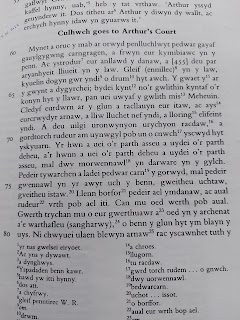Lost Realms by Thomas Williams (William Collins, 2022)
Warning: Opinionating in progress.
Lost Realms is a book with much to recommend it. The basic approach, ‘histories’ rather than ‘history’ is the only one that can deal with the ways in which Roman Britain became something else.
What intrigues me most is two aspects of William’s style. He can write very well; evoke the landscape of post Roman Britain; negotiate the tangle of evidence and contending theories that characterise the period in clear and unambiguous prose. But so much of the book relies on the reader not paying attention.
The following is a characteristic example of general style, and it illustrates two problems. The author is remembering climbing the steps to Tintagel as a child:
It felt endless that stairway-like the steps that ascended to the pass of Cirith Ungol from the Morgul Vale in Tolkien’s The Two Towers. (p.146)
You could delete everything from the dash to the full stop and the information would be conveyed successfully:
It felt endless, that stairway.
It’s a common experience, especially for children. The author can rely on most readers to understand his point (even if his intrusion of the memory into the narrative adds nothing especially relevant to the subject at hand). What follows the dash is superfluous in terms of information and is an attempt at ‘style’ but it's a strange thing to find in a history book.
If this were a personal memoire of reading Tolkien, then the comparison would be at home if it were reversed. ‘When I read about the steps that ascended to the pass of Cirith Ungol from the Morgul Vale in Tolkien’s The Two Towers I remembered the steps that lead to Tintagel.’ p.146
This would be the normal movement, illuminating the fictional by comparing it with a real, repeatable experience that is not unique to the individual. Williams consistently goes the opposite way, trying to illuminate the historical by comparing it to the fictional. (More about this in the next post.)
But what happens to the reader (me, for example) who has no idea what Morgul Vale or Cirith Ungol are? That question points to an underlying assumption, and an impossible one: the assumption that the reader shares the writer’s fictional knowledge and his attitudes. Williams’ range of reference is eclectic: The Wicker Man, the Shining, Star Wars, the complete works of Tolkien. But no concession is being made to the reader. At one point rather than rewrite an unimportant but obviously obscure reference, he would rather add a footnote to explain his explanation.
…that will embody an oddly retro-futuristic aesthetic, like the neo-Byzantine fantasies of the Trigon Empire…(p178)
The overall impression is that the author is not making an effort to communicate, rather, he is putting on a performance, and the performance assumes the reader shares his references, his fascination with his own memories, and his opinions. Which effectively means the Model Reader of this book can only be a model Thomas Williams.
Sometimes this positioning is insidious: an anecdote will be introduced as ‘comic’ or ‘blackly comic’ rather than simply left to stand alone. Sometimes it’s unintentionally funny.
The story of Uther and Ygerna is, for modern readers, an uncomfortable read.
Stop. Which modern readers? All modern readers? Are we expected to believe that those who watched Vikings and Game of Thrones, or read Fifty Shades of Grey are disturbed by this? Some modern readers? Students in universities who are told to feel uncomfortable?
But our author confesses:
I remember finding it troubling as a child and it stills leaves me feeling queasy. Not I think because the tale is in itself unusually unsettling (there are many, far more violent sentiments expressed in older Welsh and English poetry) but more for the horny relish with which Geoffrey tells it and the enormous appeal he clearly expected it to have for its intended audience…p146
I must admit I laughed aloud at this. The thought of Geoffrey writing 12th century erotica is almost as funny as thinking that what he wrote could have aroused your average clerical reader or titillated his ‘aristocratic’ listeners.
Leaving aside the thought that horny relish sounds like a strange kind of novelty pickle, I wonder how many people reading this have read Geoffrey, or how recently or how carefully Williams has? If you’re reading this and have a copy of Geoffrey handy, stop now and read what Geoffrey wrote about Uther in Tintagel. It’s only a few lines. Does this sound like ‘horny relish’? Then go back and read Vortigern’s meeting with Rowena: it’s not long either. Then remember what Geoffrey did in his day job. 'Deceived' is not a positive term.
But most people won’t stop and read Geoffrey. They won’t wonder which readers are disturbed, or whether horny relish is an accurate description. It sounds good. It sticks in the memory. The book, like many recent ones, relies on the reader never stopping to consider what the words on the page mean. The glib references aren’t meant to be examined, or even given any thought. The author is entertaining himself and scattering his references with no real interest in ‘meaning’. If the reader isn't meant to think too deeply about this; did the author?
This might sound like I’m being over critical about trivial detail, but it leads to a discussion of how the material is presented and understood, for which see next post.












